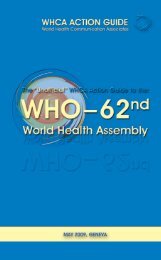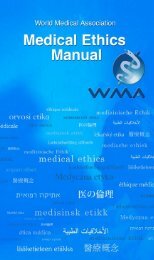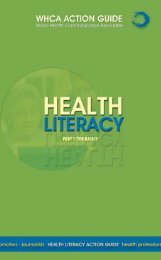the basics - World Health Communication Associates
the basics - World Health Communication Associates
the basics - World Health Communication Associates
- No tags were found...
Create successful ePaper yourself
Turn your PDF publications into a flip-book with our unique Google optimized e-Paper software.
primary, secondary, higher and adult education; health providers; print and on-linehealth information; <strong>the</strong> media; and a wide variety of community-based resources,such as support groups to assist in quitting smoking.<strong>Health</strong> literacy skills (see Box 2) include basic reading, writing, numeracy and<strong>the</strong> ability to communicate and question. <strong>Health</strong> literacy also requires functionalabilities to recognise risk, sort through conflicting information, take health-relateddecisions, navigate often complex health systems and ‘speak up’ for change whenhealth systems, community and governmental policies and structures do not serveneeds.BOX 2 : HEALTH LITERACY—FOUR INDIVIDUAL LEVEL SKILL SETS<strong>Health</strong> literacy related skills can be categorised as: cognitive (knowledge),behavioural (functional), advocacy (proactive) and existential (spiritual).Cognitive skills include general literacy, numeracy, information ga<strong>the</strong>ring skillsand analysis. These skills are used for health-related actions like reading healthwarnings and food labels, filling in forms, deciphering prescription drug instructions,as well as <strong>the</strong> ability to understand written and oral information given by health careprofessionals.Behavioural skills include more interactive literacy and social skills used tomake health risk assessment and lifestyle choices; system ‘navigation’ (finding<strong>the</strong> way to services or negotiating complex systems); self-care; and interpersonalcommunication and negotiating (e.g., asking for and receiving information, filingcomplaints or understanding health care charges, costs and bills).Advocacy skills include critical competencies to analyse health information,understand <strong>the</strong> political and economic dimensions of health, and take action toexpress opinions and make changes at institutional, community and political levels.This may include ‘speaking up’ for oneself and o<strong>the</strong>rs, taking action to promote newor change existing policies, lobbying and organising campaigns.Existential skills include <strong>the</strong> ability to make sense of a life with illness, live withuncertainty, and avoid descending into depression, self-pity, hopelessness orhelplessness. It includes <strong>the</strong> ability to grieve and to prepare for and die in a peacefulway.16SECTION 1: WHAT IS HEALTH LITERACY?






